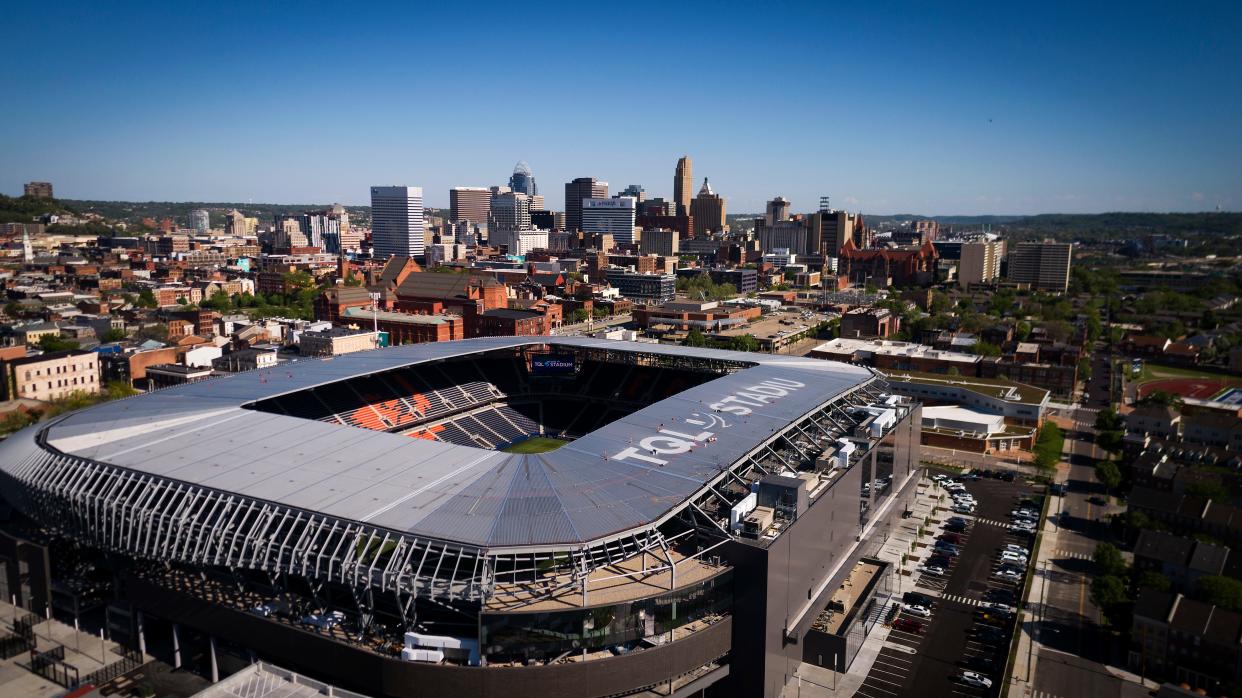At PG Sittenfeld sentencing, one final shocking allegation

- Oops!Something went wrong.Please try again later.
Editor's note: This story has been updated
The heart of the corruption allegations against former Cincinnati City Councilman P.G. Sittenfeld has always been a Downtown development project at 435 Elm Street.
But an explosive new allegation emerged Tuesday during Sittenfeld's sentencing hearing when prosecutors suggested Sittenfeld also corrupted the process of building TQL Stadium in the West End.
Federal prosecutor Matthew Singer said Sittenfeld threatened the CEO involved in a "prominent stadium deal" that the councilman would vote against the deal unless that CEO gave $11 million to a "private entity."
"If (the vote) did not go through the franchise would have gone somewhere else," Singer said. "Sittenfeld was the fifth vote. ... Withholding his vote was not based on the public good. It was not based on the merits ... it was not based on the right thing to do."
Sittenfeld's lawyer, Charlie M. Rittgers, confirmed Singer was talking about the TQL Stadium and the Cincinnati Ballet, but Wednesday denounced what he called a "false allegation."
"If the government actually believed the false accusation they made at sentencing, they would have introduced it at trial. They did not introduce it at trial because it was subject to cross-examination and rebuttal," he said.
Singer did not identify the CEO, the stadium, or the company. But his statements, made in open court, correspond directly to a vote on zoning related to TQL Stadium that The Enquirer extensively covered.
No charges ever stemmed from the stadium-related vote. But Singer said the FBI knew about the demand, which was made via a phone call, without explaining how the FBI knew about it. The FBI declined to comment Wednesday. After the Enquirer story was posted online, Jennifer Thornton, spokeswoman for the U.S. Attorney’s Office, reached out with further explanation.
“No payments whatsoever were made in response to the phone call related to the zoning vote referenced at the hearing," Thornton wrote in an email. "Rather, one of the individuals who received the call shared information with law enforcement upon request. This office relies on the courage and integrity of individuals like this in its pursuit of justice.”
She did not say who the individual was who made the call.
A new stadium and a zoning vote
Cincinnati won a Major League Soccer franchise in 2018. As part of the deal with MLS, FC Cincinnati was required to build a stadium in the urban core. After several months, the West End emerged as the most viable site, but it needed a bevy of Cincinnati City Council approvals. And it was contentious – some West End residents and community activists opposed the stadium being built there.
Sittenfeld initially opposed the stadium deal. In an open letter in November of 2017, Sittenfeld praised the goal of landing a Major League Soccer team but criticized how it was done.
"The timing, lack of due diligence, specific financing arrangement and location are, at minimum, questionable and, at worst, wrong," Sittenfeld wrote.
As FC Cincinnati pushed for the necessary city approvals, a conflict with the Cincinnati Ballet arose. The soccer team bought the building the Cincinnati Ballet rented for its headquarters in the West End. Part of the stadium would be built on the parking lot.
As the ballet pondered its future, FC Cincinnati Co-CEO Jeff Berding said in October 2018 the ballet asked FC Cincinnati to pay it $1 million for part of the land.
"This sure feels like a shakedown to me," Berding said at the time. The ballet denied it asked FC Cincinnati for money.
By the time of a critical city council vote in February of 2019, FC Cincinnati did not have the five votes it needed to re-zone the land for stadium construction, which was already a month behind schedule. Without the new zoning, construction would have stopped altogether.
What changed Sittenfeld's stance?
Ultimately, Berding garnered support from seven council members, including Sittenfeld.
So what changed? It wasn't clear in 2019 and still isn't. But the day of the zoning vote the Cincinnati Ballet and FC Cincinnati signed what Sittenfeld called a "good neighbor agreement," spelling out concessions to the ballet regarding noise, parking and help relocating.
Berding declined to comment. FC Cincinnati did not give the Cincinnati Ballet $11 million, said ballet spokeswoman Nicole Doll.
Cincinnati Ballet leaders declined further comment beyond providing a statement: "The Cincinnati Ballet never asked P.G. Sittenfeld to negotiate any financial matters on its behalf with any party."
The cooperation agreement with the Cincinnati Ballet was signed hours before the 2019 zoning vote. It called for the team to provide $1 million for noise mitigation to the ballet building in the West End, but allowed for the ballet to get the same amount of money toward building costs should it move to a new location.
In the end, the ballet did move. The Cincinnati Ballet raised $30 million to move to Walnut Hills, an announcement made in November of 2019. The new ballet building opened in September of 2021.
In court, Sittenfeld lawyer Rittgers immediately snapped back at Singer, saying that Sittenfeld actually stood up to some of Cincinnati's wealthiest and most powerful people. FC Cincinnati's majority owner is Carl Lindner III, co-CEO of American Financial Group, and the ownership includes a who's who of the Cincinnati business community.
"P.G. was willing to stand up to powerful wealthy donors and say no to them when he believed their interests did not align with the city’s interests," Rittgers said Wednesday.
This article originally appeared on Cincinnati Enquirer: PG Sittenfeld: What did he do on FC Cincinnati stadium vote?

